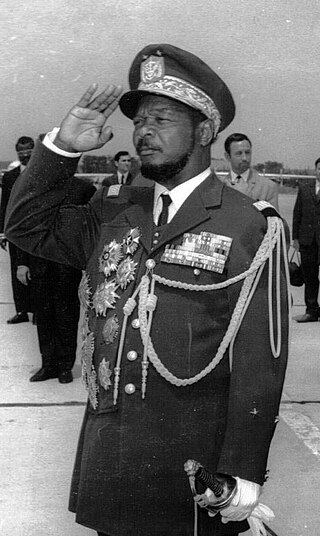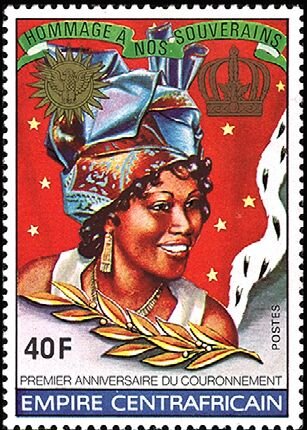Related Research Articles

Bangui is the capital and largest city of the Central African Republic. It was established as a French outpost in 1889 and named after its location on the northern bank of the Ubangi River ; the Ubangi itself was named from the Bobangi word for the "rapids" located beside the settlement, which marked the end of navigable water north from Brazzaville. The majority of the population of the Central African Republic lives in the western parts of the country, in Bangui and the surrounding area.

Jean-Bédel Bokassa was a Central African political and military leader. He became the second president of the Central African Republic (CAR) after seizing power in the Saint-Sylvestre coup d'état on 1 January 1966. He later established the Central African Empire (CAE) with himself as emperor, reigning as Bokassa I until his overthrow in a 1979 coup.

The Central African Empire was established on 4 December 1976 when the then-President of the Central African Republic, Jean-Bédel Bokassa, declared himself Emperor of Central Africa. The empire would fall less than three years later when French and Central African forces overthrew Bokassa and re-established the Central African Republic on 21 September 1979.

Elisabeth Domitien served as the prime minister of the Central African Republic from 1975 to 1976. She was the first and to date only woman to hold the position, and was the first woman to serve as prime minister of a country in Africa.

André-Dieudonné Kolingba was a Central African politician, who was the fourth President of the Central African Republic (CAR), from 1 September 1981 until 1 October 1993. He took power from President David Dacko in a bloodless coup d'état in 1981 and lost power to Ange-Félix Patassé in a democratic election held in 1993. Kolingba retained the strong support of France until the end of the Cold War in 1992, after which both internal and external pressure forced him to hold presidential elections which he lost.

Kiki Smith is a German-born American artist whose work has addressed the themes of sex, birth and regeneration. Her figurative work of the late 1980s and early 1990s confronted subjects such as AIDS, feminism, and gender, while recent works have depicted the human condition in relationship to nature. Smith lives and works in the Lower East Side, New York City, and the Hudson Valley, New York State.
Jean-Bédel Bokassa Jr. is a son of Jean-Bédel Bokassa, the former Dictator and Emperor of the Central African Republic and its successor state, the Central African Empire, by his sixth wife, Catherine Denguiadé.

Hardricourt is a commune in the Yvelines department in the Île-de-France region in north-central France.
Lieutenant Colonel Alexandre Banza was a military officer and politician in the Central African Republic. Born in Carnot, Ubangi-Shari, Banza served with the French Army during the First Indochina War before joining the Central African Armed Forces. As commander of the Camp Kassaï military base in 1965, Banza helped Jean-Bédel Bokassa overthrow the government of President David Dacko. Bokassa rewarded Banza by appointing him as minister of state and minister of finance in the new government. Banza quickly established the new regime's reputation abroad and forged diplomatic relations with other countries. In 1967, Bokassa and his protégé had a major argument over the president's extravagances. In April 1968, Bokassa removed Banza as minister of finance. Recognizing Bokassa's attempts to undermine him, Banza made a number of remarks highly critical of the president's handling of the government. Bokassa responded by abolishing the minister of state position.

The House of Bokassa is an African former ruling imperial dynasty. Its founder, Jean-Bédel Bokassa, ruled as self-crowned emperor over the territories of the Central African Empire from 4 December 1976 until 21 September 1979, when he was overthrown. His claim to an imperial title had little recognition in the international community.

Emperor of Central Africa was the title used by Jean-Bédel Bokassa from 4 December 1976, who was crowned on 4 December 1977 in a lavish ceremony that was estimated to cost the Central African Empire US$20 million. Although nominally a constitutional monarch, in practice Bokassa ruled with absolute power. For all intents and purposes, the country was still a military dictatorship, as had been the case with the Central African Republic since Bokassa took power in the 1966 coup d'état.
Operation Caban was a bloodless military operation by France in September 1979 to depose Emperor Bokassa I, reinstate the exiled former president David Dacko, and rename the Central African Empire back to Central African Republic.

Marie-Josèphe Zani-Fé Touam-Bona was a politician in the Central African Republic (CAR). She was the country's first female government minister.

Central African Republic–France relations are foreign relations between the Central African Republic (CAR) and France. Both nations are members of the Francophonie and the United Nations.
Marie-Reine Hassen, is an economist, diplomat and politician from the Central African Republic. She was one of the 17 wives of Jean-Bédel Bokassa, CAR dictator. She was a goodwill ambassador in Senegal from 2003 to 2006, Minister Delegate for Foreign Affairs from 2006 to 2007, Minister Delegate for the Economy, Planning and International Cooperation from 2007 to 2008, and then Minister Delegate for Regional Development from 2008 to 2009. She founded the Movement for Rallying and Change. She was a candidate for her country's 2010 presidential election.

The coronation of Bokassa I and Catherine as the Emperor and Empress of Central Africa took place on 4 December 1977 at a sports stadium in Bangui, the capital of the Central African Empire. It was the only coronation in the history of the Empire—a short-lived one-party state and self-proclaimed monarchy—which was established in 1976 by Jean-Bédel Bokassa, military dictator and president for life of the Central African Republic.

Catherine Martine Denguiadé, also known as Catherine Bokassa, is a Central African former member of the royal family and the widow of Jean-Bédel Bokassa. She was one of several wives of Emperor Bokassa but she became the Empress when he created the Central African Empire. Her son was chosen as his heir apparent.
Bokassa may refer to:

On 19 April 1979, approximately 100 students were massacred in Ngaragba Prison, in Bangui, Central African Empire, following student protests against self-proclaimed emperor Jean-Bédel Bokassa.
References
- 1 2 Nordlinger, Jay (22 Sep 2015). Children of Monsters: An Inquiry into the Sons and Daughters of Dictators. Encounter Books. ISBN 9781594038167.
- 1 2 3 4 "Dieci", a new exhibition by Kiki Bokassa in Beirut, iloubnan.info, May 16, 2011. Retrieved 2012-02-06.
- 1 2 Bokassa's Mural signing ceremony Archived 2013-01-23 at archive.today , Executive Company Bulletin, November 18, 2008.
- ↑ Mosley, Matthew (25 April 2009). "Living under public scrutiny with life emulating art". Daily Star . Retrieved 7 February 2012.